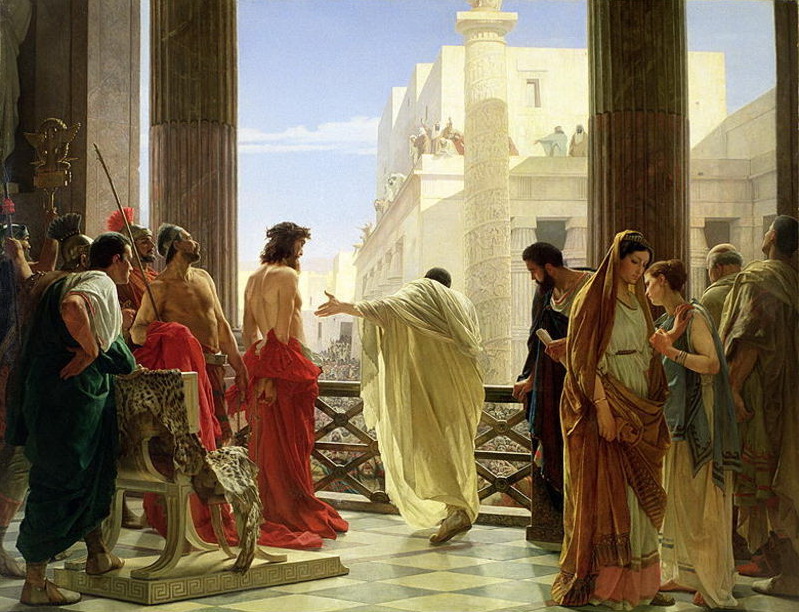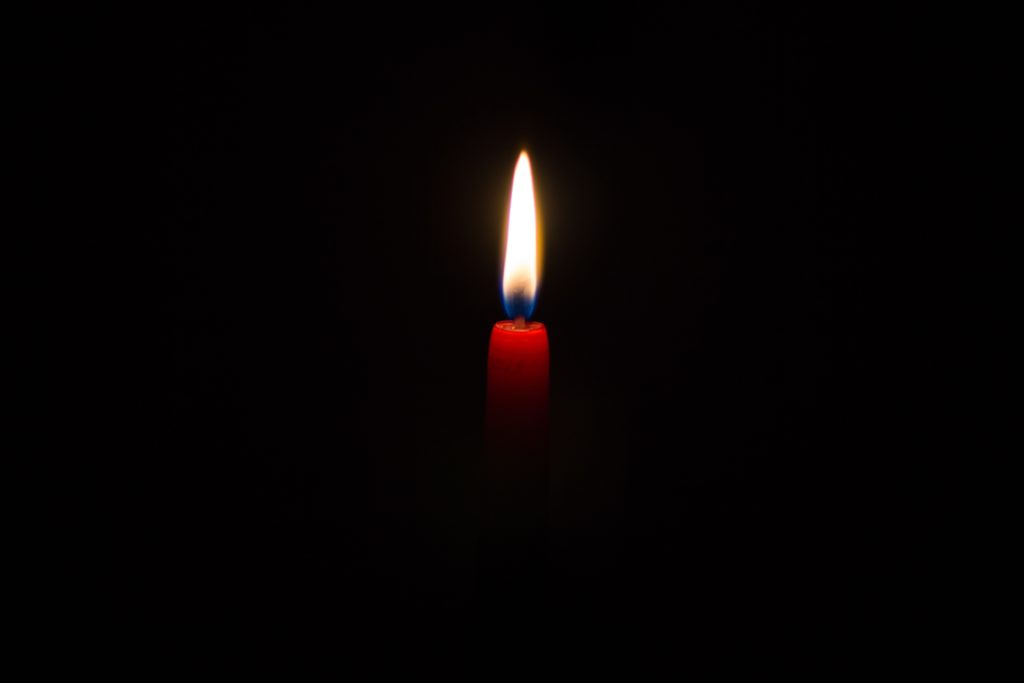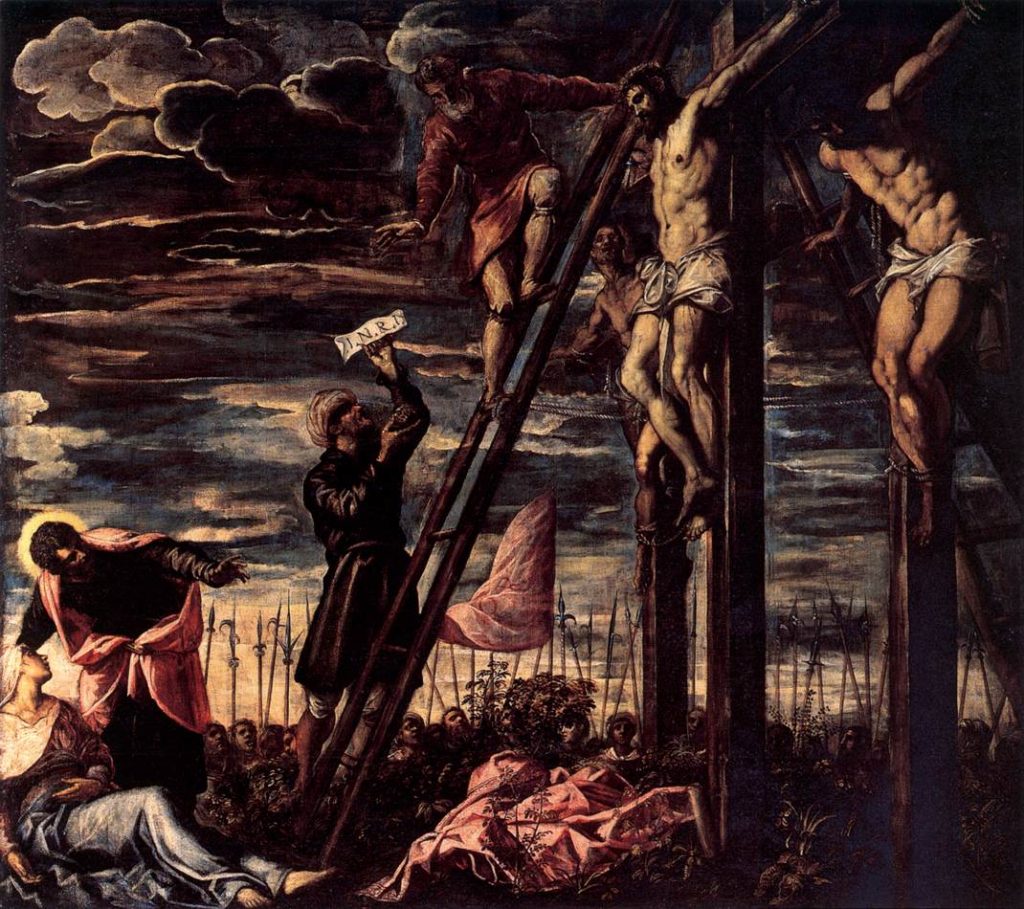Post Category → Faith
Our Extraordinary “Hyperlinked” Bible
Posted this over at the Cup & Table Co. blog. Have a look . . .
This Woman of Mine
 I’m working from home today and Mrs. H is out of the house, throwing herself headlong into a long list of tasks for me, her work, her family, and for friends. As all who know her will attest, she is a force of nature. Some wonder what her secret is. I know all of her secrets.
I’m working from home today and Mrs. H is out of the house, throwing herself headlong into a long list of tasks for me, her work, her family, and for friends. As all who know her will attest, she is a force of nature. Some wonder what her secret is. I know all of her secrets.
In fact, as I sit here on our sofa where we share morning coffee, one of them is visible just to my left. The evidence is visible in the photo above. She is a woman of the Word.
All is just as she left it this morning. And every morning. As she is prone to reminding herself, me, and those she loves:
Wisdom shouts in the streets.
She cries out in the public square.
She calls to the crowds along the main street,
to those gathered in front of the city gate:
Come and listen to my counsel.
I’ll share my heart with you
and make you wise.
She has heeded, wisdom’s call, this woman of mine. Father, “Reward her for all she has done.” (Proverbs 31:31)
On Earth as in Heaven
Many believers have misinterpreted Jesus’ words in John 18:36, wherein Jesus tells Pilate, “My kingdom is not of this world.”
They take this to mean that Jesus’ Kingdom has no earthly manifestation. In other words, that until His physical return, His kingdom remains exclusively spiritual and therefore invisible.
The unavoidable implication of this is that the believer should not expect the advance or expansion of Jesus’ kingdom to impact the natural world—including our physical bodies, nature, or earthly institutions.
Consistent with this view, many believers gauge the expansion of His kingdom by one measure alone . . . souls saved.
But is this an accurate understanding of Jesus’ words to Pilate? I don’t think so.
Understanding the words, “My kingdom is not of this world,” hinges on the meaning of the word “of.” I’m convinced that Jesus was saying that His kingdom’s legitimacy and validity did not derive from any earthly source. Rather, the authority and legitimacy of His rule was (and is) rooted in Heaven—a much higher source.
Consider the context. Jesus is being questioned by an earthly ruler, Pontius Pilate. Pilate was the ruler of the prefect of Judea because the Roman Emperor Tiberius designated it so. Pilate’s authority and legitimacy was rooted in the earthly power of the Roman Emperor and the Roman Senate.
In other words, Pilate’s kingdom was of Rome.
Jesus knew this was Pilate’s frame of reference when he asked Jesus: “Are you the King of the Jews?” The implication behind the question is, “If you are the King of the Jews, then some earthly authority must have declared it so.”
Perhaps the Jewish people took a vote. Maybe the Sanhedrin had convened a secret council and determined that Jesus was indeed the rightful heir to David’s throne. Maybe an enemy foreign government was trying to destabilize the eastern edge of the Roman Empire by installing a rival ruler.
With a single phrase, “My kingdom is not of this world,” Jesus swept away all of these unspoken questions. Meaning, “Yes, I am a king, but not because any earthly legislative body or governmental authority says so. The throne that declares me a king is not anywhere on this planet.”
The words Jesus spoke immediately following this response validate this interpretation:
“If My kingdom were of this world, My servants would fight, so that I should not be delivered to the Jews; but now My kingdom is not from here.” (John 18:36)
In other words, “If my kingdom were rooted in earthly authority then earthly people would use earthly force to keep me from being killed.”
Nothing in Jesus’ response should keep us from expecting that the expansion of His rule—seeing His will be done on earth as it is in Heaven—will impact the physical realm here and now.
That physical realm includes your physical body; your family and home; your neighborhood, community, and the entire culture. But we don’t see these impacts if we don’t believe they are legitimate.
In the light of all this, it’s not surprising that an era in which the dominant evangelical theology has marginalized the concept of Jesus’ kingdom to being wholly invisible and largely in the future . . . is the very era in which the earthly institutions such as the arts, academia, the sciences, and government have been overtaken by darkness and godlessness.
The kingdom of Jesus is a present and progressively unfolding reality.
No, it is not of this world, but it is very much in it.
He Arose in the Dark
He arose in the dark.
Our familiar Easter sunrise services have trained us to associate the resurrection with sunrise. This is because the discovery of the empty tomb by the women occurs around daybreak. All four gospels record their arrival at the tomb at or just before sunrise on the day after the Sabbath. As Mark describes it, “Very early in the morning, on the first day of the week, they came to the tomb at the rising of the sun.”[1]
This means they assembled and began their journey to the garden while it was still quite dark. When they arrived, as every Sunday School child can tell you, the tomb was already quite empty.
So, I emphasize this once more. He arose in the dark. There is a large message in this small detail of the resurrection narrative.
We ought not wait for our circumstances to brighten to put our hope in a faithful God. We must not say to God, “Show me some improvement and then I’ll believe in your goodness and mercy.”
No, it is when things seem the most hopeless and grim that we should anchor our faith to the rock of expectancy. It is when it seems “too late” that we must muster words of praise and thanksgiving.
We all recall that Paul and Silas sang a hymn of praise from the depths of a filthy Philippian dungeon, but do we remember when? I summon Acts 16:25 to rise and testify. “At midnight Paul and Silas were praying and singing hymns to God . . .”
When did these shackled saints find their song of praise? At midnight! When things seemed the most hopeless! You know the result. “Suddenly there was a great earthquake, so that the foundations of the prison were shaken. And immediately all the doors were opened and everyone’s shackles were loosened.”[2]
Oh, dear child of God, do not wait on the dawn to find your shout of confidence in God. Sing your song now, in the middle of your midnight hour, when trouble seems to be pressing in all around you. Anyone can sing a hymn at noon under a clear blue sky. That kind of faith doesn’t alarm principalities and powers.
The day doesn’t begin at dawn. It begins at midnight. Likewise, that is when God’s resurrection power comes. Tombs open in the middle of the night. Graves burst open in the middle of the night. Jesus comes walking on the waves in the middle of the night with a message for you and me. It is that very one He spoke to Jairus who had just absorbed the news that his daughter had died, “Do not fear. Only believe . . .”[3]
Don’t be afraid of the dark.
[1]Mark 16:2
[2]Acts 16:25-26
[3]Luke 8:50
A Glance Back in Gratitude. Forward in Hope.
Mrs. H and I are suffering from Full Heart Syndrome here on this morning after Christmas Day. The last few days have been rich and sweet. In fact, the whole year gifted us with things for which we are profoundly grateful.
2017 was a year of four milestones.
April brought our first grandchildren into our lives. That’s right—plural—as our oldest and her sweet husband blessed us, and the world, with twin girls.
Meet Instagram stars, Cora Lee and Winnie Ruth. Many immediately remarked that they resembled yours truly. It’s possible. But I’ve discovered that when you’re bald and doughy, there is a sense in which nearly all newborns resemble you.
In any event, I can say without fear of contradiction that they are the cutest little things on the planet.
If we can get the names to stick, Mrs. H and I will be “Gigi and Pop.” Of course you never know. I’ve observed that the adorable mispronunciation that comes out of a todder’s mouth often becomes the moniker that endures for the rest of your grandparenting career. So it’s very much a theoretical possiblity that we will end up as “Gaggy and Poop.” These are the risks you take in life.
Around their six-month birthday, the little ladies got to attend their first formal affiar—the wedding of their auntie Olivia. This was the second major milestone event in our 2017. As I explained in a previous post, our youngest was married a few weeks ago, in October—our third and final chickadee to leave the nest.
Speaking of nests . . . In the midst of that celebration, we learned the wonderful news that our middle daughter, who was married the previous October, was expecting as well. This was milestone three. (See my previous post about this blessing.)
Over the last few days we had the opporunity to have all four households together under one roof. This is no small blessing, of course, as our sons-in-law have wonderful extended families of their own who want and deserve to have some time with them as well.
Thus we were delighted and grateful, here on our first Christmas with three married daughters and two girly grands, to observe our cherished traditions together. And particularly happy to have Tracy’s mom with us to savor the history-making, memory-making milestone.
We spent a good chunk of Christmas day watching old home movies so the sons-in-law could see how cute their brides were when they were little. For a couple of decades I, like many dads of the 90s, viewed every major family gathering and church/school event with one eye through the tiny viewfinder of a bulky camcorder. But it was worth it to be able to preserve those moments for days like yesterday.
Lots of lights begin to come on when you grow up and get married. Even more pop on when you have kids of your own (or are about to). You can find yourself viewing well-remembered events through a new lens. So, as the happy ghosts of Christmases 20-years-past danced across our television screen yesterday, Mrs. H and I enjoyed watching the girls see themselves (and their parents) with new, adult eyes and grown up understanding.
What I believe they saw and heard on those videos were two people who adore and respect each other, doing their best to love well the children God had placed in their care.
They saw a mother who went to extraordinary lengths to create a home filled with beauty, warmth, order, harmony, and delight. A woman who transformed every place we landed into a cozy little echo of the garden of Eden on earth. Who made every day a party, and every party a grand affair.
They saw two people striving, as best they knew how, to teach them gratitude and selflessness and generosity and empathy. To help them feel both safe and courageous. To instill in them confidence, character, and compassion.
Most of all, to initiate them into the most vital mysteries of all:
- That God is.
- That He is good.
- That He unfailingly rewards those who seek Him by allowing Himself to be found.
- That we’re all born broken, flawed, and in desperate need of a Savior.
- And that such a Savior—the wonderful Jesus—ever stands at the door knocking; ready to come in and feast with all who will simply open to Him.
All these thoughts and many others swirled in my mind as Mrs. H and I crawled into bed last night. We talked of how precious the last few days had been to us. And of how quickly this just-completed chapter of our lives seemed to pass. How is it possible that many of those events we watched on video transpired 25 years ago?
In that moment last night, I looked across the bed at my God-given life’s companion and spoke the truth my heart was holding:
“Honey, I’ve adored every day of it. I have absolutely loved living this adventure with you more than I can express, and wouldn’t trade a single minute of it. I’ve loved being your husband. I’ve loved being their dad.”
Hand to heaven, it’s the truth. From the “I do” to the “It’s a girl” (three times) to the “Sir, I want to marry your daughter” (three times) . . . every thread of it is pure gold to me, and I have no regrets. Certainly not about the husband-father aspect of my life and choices.
Our fourth milestone came just a few days ago as we celelbrated our 30th wedding anniversary.
Of course, this adventure isn’t over. As I’ve noted previously, life is a play in three acts. Act 1 is Birth to Marriage. Mrs. H and I have just completed Act 2—Marriage to Empty Nest.
The curtain has just risen on Act 3.
I have some specific hopes for this next leg of the voyage. I believe days of impact, influence, and legacy-building lie in the decades ahead. Days of teaching and writing and mentoring. They will be good days. But if it all ended today, I’d be okay. I’d head home with a heart filled with gratitude for the abundance of gifts already received. And for the legacy already in motion.
Tetelestai Indeed
The Savior’s final words from the cross were a prayer of faith:
“Father, into your hands I entrust my spirit.”
Only moments earlier, the witnesses gathered around the dying Prince heard Him shout something else. A single word. The Word-Made-Flesh yells a Greek accounting term . . .
tetelestai!
Our English Bible translations of John’s gospel render that term in a way that tends to drain it of the legal and financial connotations it carried for hearers of Jesus’ day. The best we can come up with is the bland and colorless, “It is finished.”
Charles Spurgeon called this declaration, “Christ’s dying word to the Church.” Yet tetelestai does not mean merely that a thing has concluded. It does not simply indicate that the curtain has come down and the show is over. “The End.”
No, to declare a thing tetelestai is to decree all has been accomplished. Everything formerly lacking has now been supplied. The wound has been healed. The obligation met. The debt satisfied to the uttermost.
But Jesus’ tetelestai declaration carries yet more dimensions of meaning.
It also means that all the types, shadows, and symbols of the Old Testament have now been fully realized (in Him). All to which the Law, the Prophets, and the prophetic narrative pointed has been fulfilled.
Three years prior to this royal proclamation John the Baptist had asked, “Are you the One or should we look for another. Jesus’ answer at that time was suggestive but indirect. Now, in his final minutes, He speaks plainly.
His tetelestai! declares:
“You can stop looking! The promised one has come and accomplished the prophesied task. I, the Second Adam, have rectified, remedied and restored what the First Adam forfeited. Dominion of planet earth has been restored to its rightful steward.”
Furthermore, in that one-word cry of consummation, Jesus declared an end to Man’s Babel-ish, religious striving to build a ladder back to God. God Himself has come down and done what no fallen man could do. That is, satisfy Mankind’s staggering legal-spiritual obligation.
”In an 1861 sermon titled “It is Finished!,” Spurgeon said of that cry of tetelestai:
“The Savior meant that the satisfaction which He rendered to the justice of God was finished. The debt was now, to the last farthing, all discharged. The atonement and propitiation were made once for all, and forever, by the one offering made in Jesus’ body on the tree.
There was the cup; hell was in it; the Savior drank it—not a sip, and then a pause; not a draught, and then a ceasing; but He drained it till there is not a dreg left for any of His people!
The great ten-thronged whip of the law was worn out upon His back; there is no lash left with which to smite one for whom Jesus died! The great bombardment of God’s justice has exhausted all its ammunition; there is nothing left to be hurled against a child of God! Sheathed is your sword, O justice! Silenced is your thunder, O law!
There remains nothing now of all the griefs, and pains, and agonies which redeemed sinners ought to have suffered for their sins, for Christ has endured all for His own beloved, and “It is finished.”
Yes, “Finished!” we hear Him cry. Then He slowly bows that thorn-pierced head. Of course, he bows. His monumental work of redemption is complete, and there is nothing left to do but to say a benediction.
“Father, into your hands I entrust my spirit.”
Some Words of Gratitude for the Gospel on International Women’s Day
Permit me to point something out that isn’t widely understood or acknowledged in our Postmodern, Bizarro-World times.
Whereever the gospel of Jesus Christ has spread and taken root, the lot of women has radically improved. Conversely, the places where Christianity is least historically present and welcome . . . these are the most hellish places on our planet to have the misfortune of being born a girl.
For the whole of human history, the default setting in our fallen world has been to treat women as property or sex slaves. Paganism is the original “rape culture.”
Jesus shocked the sensibilities of the dominant culture in His day by welcoming women into His inner circle–accepting their worship and follower-ship. And wherever the movement He launched has spread—relentelssly, progressively, although imperfectly—women’s lives have improved and their status has risen.
This, in part, because redemption produces more civilized, responsible, peaceful, compassionate men.
Western Civilization is, in essence, a manifestion of Christian civilization, a.k.a., the Kingdom of God. The Gospel is the greatest force for human equality ever unleashed. The seeds of the end of slavery in Europe were scattered from Britain’s Protestant pulpits. It took longer, but the same was true in North America.
The Gospel is the greatest force for human equality ever unleashed.
The Abololitionist movement was born and fueled by churches. Just as most of the concern, energy, and money for fighting modern slavery (in the form of human trafficking and sex slavery) is coming from Christian people in Christian ( and formerly Christian) nations.
Perversely, a majority of the self-identifying feminists of our day view Christianity as Enemy Number One, while being inexplicably willing to accommodate Islamic Culture and actively embrace Hindu Culture in the form of Eastern Mysticism.
A few facts for your consideration on this International Women’s Day:
- Forced Female Genital Mutilation (FGM) is widespread across Africa, the Middle East, and south Asia—whereever Islam or Animism is the dominant cultural force.
- FGM is spreading across the world with emigration and refugee flows, amplified by high birth rates among the practicing communities.
- Rape is pandemic in India and the nation serves as a major hub for the international trade in sex slaves.
- By some estimates, more than 30 million people are living as slaves right now. Most of them are women. And the bulk of these are living in India, China, Pakistan.
I am a husband to an extraordinary woman, and father to three more of the same. A few weeks from now, twin girls will be added to our clan. How grateful I am they were born in a Gospel-infused, Gospel-informed culture.
It is a privilege I seek and pray for every little girl in every corner of the world.
An Informal Little Bible Study
Attention DFW readers,
I’m launching a short new Bible study series in our home next week.
Beginning next Wednesday night, February 1, and continuing for the next four Wedneday nights, I’ll be teaching a series I’m calling:
“Honeycomb Lying on the Ground: The Sweet Reality of Living in Kingdom Grace.”
Open to all. 7:00 pm to 8:30 pm.
It is Clear to Me . . .
. . . that Mankind’s oldest and bitterest enemy is keenly interested in dividing people along racial (tribal) lines. It’s his oldest, tiredest, and yet still most effective trick.
Tribalism has been the spawning ground of murderous hate ever since the very first farmer grew resentful of the very first rancher back in the Garden.
In a 100-day period back in 1994, somewhere between 500,000 and a million Tutsis were killed by Hutus—most of them hacked to death with machetes—because . . . tribes. Us and Them.
Here in America, tribalism now goes by the more sophisticated name of identity politics. We call our tribes “communities.” The enemy of our souls doesn’t really care who you hate, just as long as you pick a side and let the news and social media fuel your tribal fire.
The devil is a sadistic, twisted kid nudging two hungry dogs toward each in hopes they’ll fight to the death over a scrap of food. I’ll pass.
As a citizen of a kingdom in which race and sex are meaningless concepts (Gal. 3:28), I have only one side to take. The side of love.











